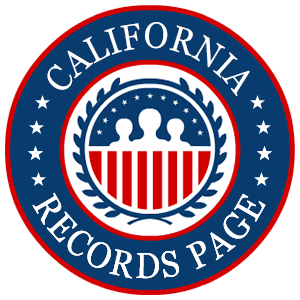Look up free California divorce records in just minutes using the guidance and links in this streamlined resource.
Records of dissolved marriages are readily accessible through state and local databases, but finding these databases and knowing which agencies host them is key.
Divorce records, decrees, and certificates are sought for many reasons, such as curiosity, familial research, or legal processes like changing one’s last name. No matter the case, this resource directs citizens through the most efficient process to obtain records of divorce in the state of California, whether online, in person or via mail.
Who Can View Divorce Records in California?
Divorce records are made available to the public as part of California law Rule 8.83 on Public Access. In general, anyone can access divorce records thanks to this rule.
However, not all of the details of a divorce case might be available. For discretion or confidentiality, the parties may request the divorce court to redact information from the papers or seal certain records, as individuals may wish to keep certain details of the case private and inaccessible to the public.
These details may include the reason for the divorce, health-related information for either party, children’s names, adoptions, or any alimony, settlements, or payments related to the dissolution of the marriage.
Additionally, it is important to note that there are two types of certified divorce records available in the state of California: (1) informational copies, which do not have the court’s seal on them, and (2) authorized copies, which are official records of the court but are only made available to the parties in the divorce and their legal counsel, if any.
How To Obtain California Divorce Records at No Cost
Though available for free as per California law, obtaining the information related to a divorce record or divorce certificate can be tricky for several reasons.
The state rule 8.83 on public access cited above mandates that electronic access be granted to the dockets or registers of actions, calendars, and opinions for court cases. This means that only limited information related to the divorce action, such as the filing date, case number, names of the parties, and results or pleadings, are available online.
The divorce decree includes the divorce action along with the additional terms related to the case, including the division of assets and property, child custody and support, and alimony or spousal support. To obtain the divorce decree, searchers will need to contact the courthouse of the county in which the divorce was filed.
However, seekers of CA divorce records might not need to contact the local courthouse in order to obtain the information they need. While there is no single, universal divorce index, instead, seekers can visit the website for the California Department of Public Health – Vital Records (CDPH-VR) division, which maintains divorce records for the years 1962 through June 1984.1 Applicants can access the form online.
However, these are just the divorce records and not the divorce decree. For the decree, searchers would need to contact the local courthouse in the county in which the divorce case was filed.
Searching Counties & Cities in CA for Divorce Records
Below are three of the most populous counties in the state of California, along with the name, address, and contact information for the courthouse in each county so you can begin a formal request for a divorce record.
Again, you can request the divorce information (the “action” cited above) for free by searching each courthouse’s website; however, for the more detailed “decree,” you will most likely need to visit the courthouse in person, place a phone call, send a request through the mail, or complete the request online, often for a fee. Fee information for record and document retrieval is also provided by each courthouse.
The Superior Court of California in Los Angeles County offers citizens access to an online case lookup that can be used to find information on divorces that were finalized within their jurisdiction. Interested parties can refer to these locations and addresses for more details.2
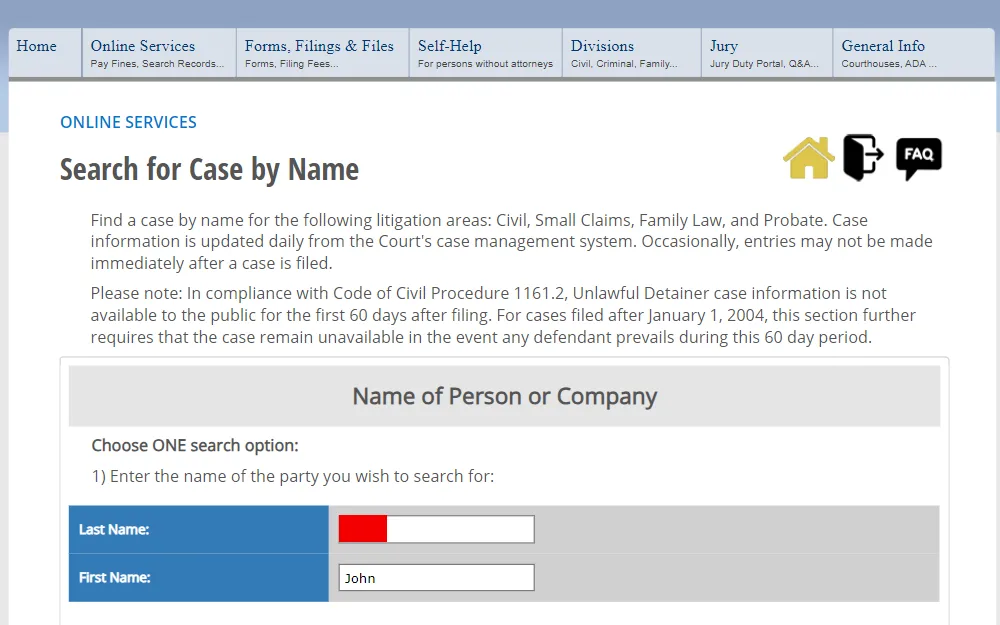
Information related to divorce filings and judgments is available at the Los Angeles Superior Court, where the divorce was filed. Searchers can obtain documents by visiting the courthouse in person or by sending a request via U.S. mail or online.
To obtain a divorce judgment document, seekers must first know the case number. If a case number is not known, the Los Angeles Superior Court provides a tool to search for a case by party name. Once seekers have the case number, they can proceed to the court document order system.4
The fee schedule is as follows: $0.50 per page for the first copy and $0.50 per page for additional copies. Additional document fees include $15 per copy for certification and $50 for exemplification, which includes additional signatures. Non-certified copies are free.
Though searching, review, and payment are all conducted and paid for online, it is important to note that seekers do not receive the divorce records electronically. Instead, the documents are mailed to the seeker via U.S. mail.
Searchers should note that the Los Angeles County Registrar-Recorder/County Clerk does not keep records of divorce records or information.
In addition, those who are interested may also read the steps for obtaining divorce records in Los Angeles County for more insights.
As with the Superior Court of Los Angeles, the Superior Court of California in San Diego County allows individuals to obtain documents by visiting the courthouse in person or by sending a request via U.S. mail or online.5
| Courthouse Facility | Address | Phone Number |
| Central Courthouse | 1100 Union St., San Diego, California 92101 |
Older Records: 619.844.2400 Family Court Services: 619.844.2888 Family Law: 619.844.2777 |
| North County Division | 325 S. Melrose Dr., Vista, California 92081 |
Family Court Services: 760.201.8300 Family Law: 760.201.8600 |
| East County Division | 250 E. Main St., El Cajon, California 92020 |
Family Law: 619.456.4100 |
| South County Division | 500 3rd Ave., Chula Vista, California 91910 |
Family Court Services: 619.746,6097 Family Law: 619.746.6200 |
Searchers can first search for the case number by party name and then visit the case register of actions for family law cases, which include the dissolution of marriage, where they can enter the case number in order to locate the divorce record.
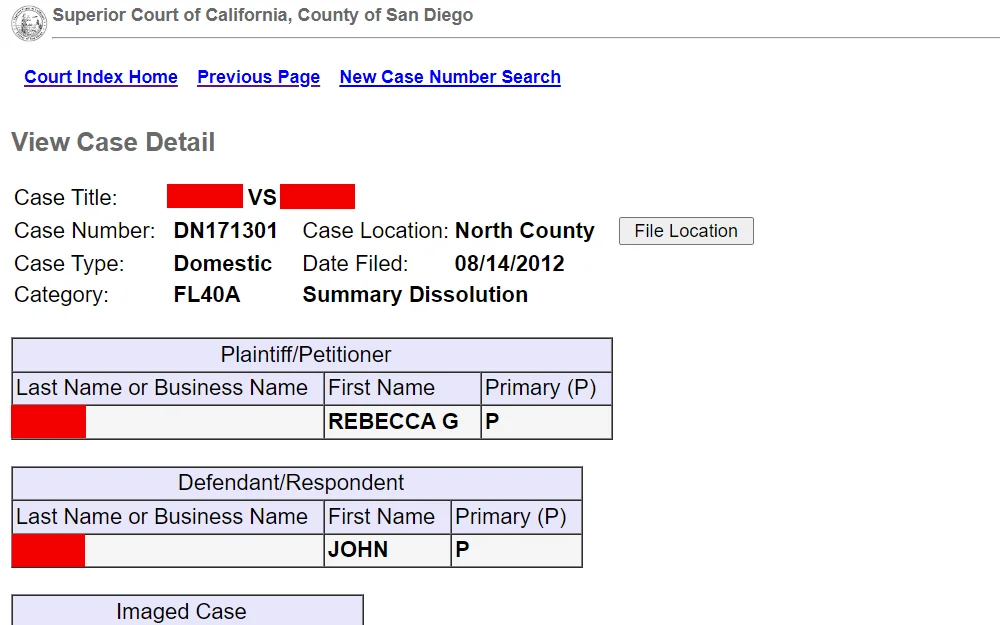
As for fees, the court charges $0.50 per page per copy; additional document fees include $40 per copy for certification and $50 for exemplification, which includes additional signatures. The Superior Court of San Diego provides a complete list of court-related fees.
Again, documents are not available electronically; instead, they are mailed via U.S. mail.
The San Diego County Recorder’s Office does not hold divorce records but does issue and record marriage certificates.
Searchers may refer to the overview of retrieving divorce documents in San Diego County for a more elaborate information.
The Superior Court of California in Orange County maintains records and copies of family law cases, which include divorce. Copies can be requested both in person at the Superior Court of Orange County Justice Center and online.
Superior Court of Orange County – Central Justice Center
700 Civic Center Dr., W.
Santa Ana, California 92701
Phone: 657.622.6878
Seekers can locate documents by searching the case number or by first creating an account and searching by name. The fees are the same as those for the Superior Court of San Diego (see above).
The Orange County Clerk-Recorder Department does not keep records of divorces, but it does maintain copies of marriage certificates. Searchers can obtain either certified or informational copies of such documents.
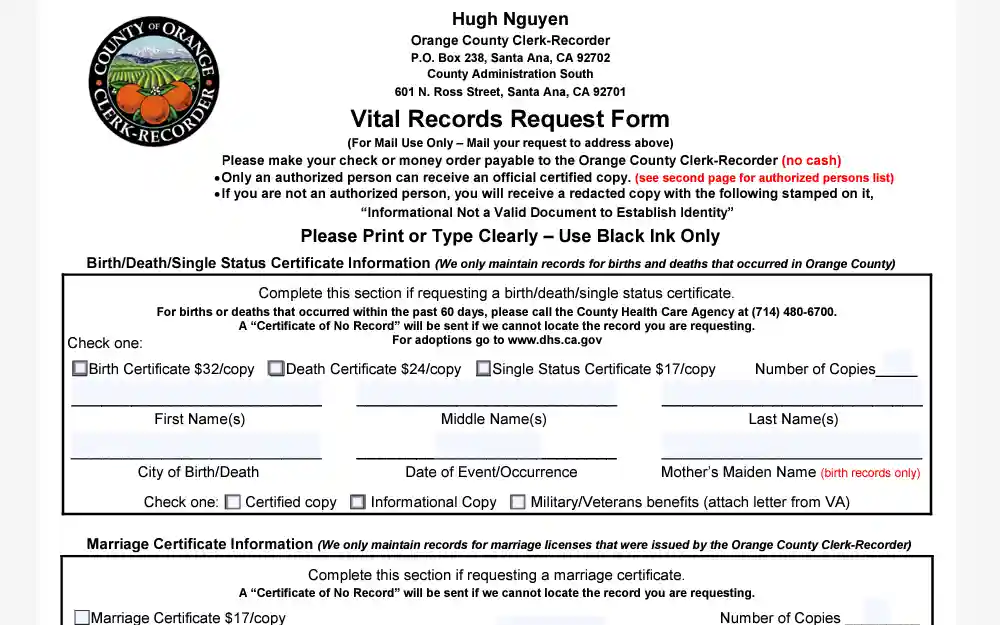
More details can be viewed through the guide to locating documents of divorce in Orange County, California.
Tracking Family Lineage & Genealogy via the California State Divorce Archives
As cited above, older divorce records from the years 1962 through 1984 can be obtained from the California Department of Public Health – Vital Records (CDPH-VR) office.
However, for divorces that occurred earlier than 1962, searchers will need to be more creative and flexible. Those interested in such records might not need specific details surrounding the divorce, such as how property and assets were divided between the couple.
Instead, searchers for divorces that occurred 60 years ago and earlier might be curious about researching the lineage of their family or loved ones. Additionally, they could be completing research for academic purposes and need to demonstrate proof that a marriage was dissolved on a certain date.
Below are a few resources to explore when needing to search for an older divorce record in the state of California:
The U.S. National Archives and Records Administration has resources for genealogists and those interested in learning more about a family’s history. Searchers may wish to first consult the National Archives Catalog, which will list descriptions and locations of documents, in order to facilitate a search.
While there isn’t an exclusive database on divorce, record seekers may find legal or property information, such as court records and land records, that may include information related to a divorce.
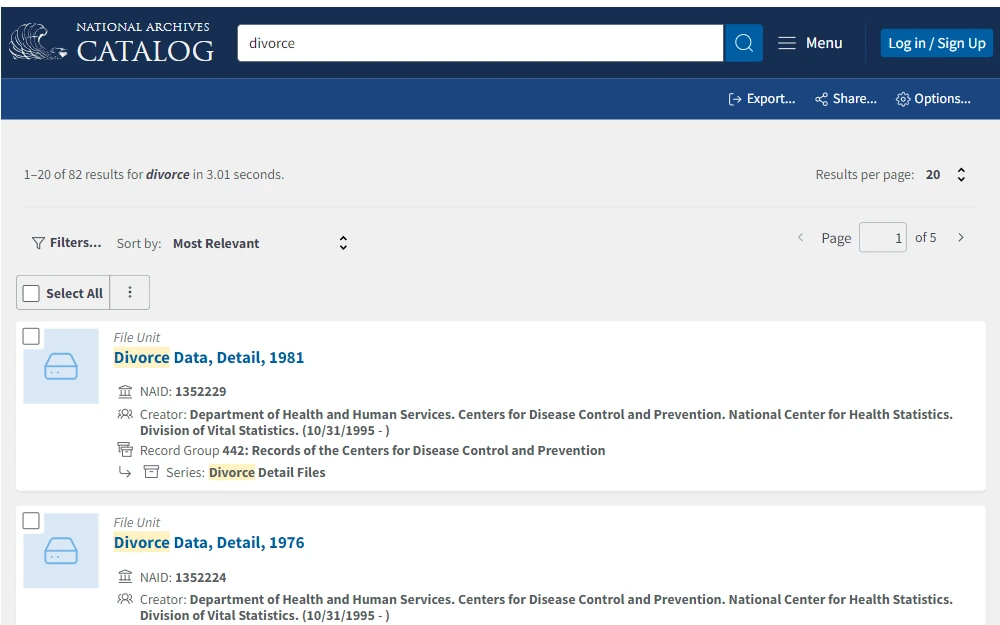
The California Secretary of State manages the California State Archives, an archive of documents made available to the public via legislation passed in 1850. To facilitate the discovery of records, the agency has made a Collections & Catalogs page available that organizes and describes the records in the archive.9
Searching a newspaper’s archive could be another option to obtain information related to a divorce. While the actual divorce decree would not be made available in the newspaper, articles referencing a divorce, especially if the individual or their spouse were influential, might provide enough information a searcher is looking for.
The Los Angeles Times, the newspaper with the largest circulation in California, offers some options for searchers looking for past articles. Current subscribers have full access to articles on the website, including most articles published since 1985.
However, for those needing information older than 1985, people can search for printed articles and clips dating back to 1881 via the Los Angeles Times’ partnership with the database service newspapers.com.
Another source for older legal documents, articles, and announcements, which could give a searcher some indication of when a divorce may have occurred, would be historical societies. Part museums, part libraries, part educational institutions, and historical societies are often nonprofits that receive funding from and are endorsed by governments.
The California Historical Society (CHS) maintains a research library and archive containing extensive collections of rare books, manuscripts, newspapers, and other content documenting the history of the state and its inhabitants.
According to the website, the CHS does not specialize in genealogical materials but does acknowledge that the organization’s archives might be helpful for people seeking information on their ancestors.
Religious institutions could be yet another option for those searching for divorce records in CA. While records of divorce might not be available, especially if that institution does not recognize divorce, there could be records of a marriage. Searchers can discover that a marriage occurred and then use that information as part of a broader search into the personal history of an individual.
If a ceremony was performed by a particular church in a particular city or metro area, a searcher can contact that house of worship and ask if any written or digitized records exist. Calls or in-person visits would most likely be necessary, as the local house of worship would most likely not have the resources to digitize and manage records online.
How To File for Divorce or Address Served Divorce Papers in California
The state of California makes it streamlined for people to get a divorce. You can do it without a lawyer and via a self-service portal available on the State of California Judicial Branch webpage.
Getting a divorce is as simple as starting and filing a court case. California allows for a no-fault divorce, in which either spouse can file for a divorce without first explaining why they are filing for divorce or demonstrating any conflict or wrongdoing on the part of the other spouse. (The opposite of this is an at-fault divorce.) In fact, a person can file for divorce even if the other person does not want the divorce.
To file for divorce in California, there are 4 steps, as outlined below.
- Make sure you meet the residency requirements: Either you or your spouse has to have lived in California for the past 6 months. Also, either you or your spouse has to have lived in your current California county for the past 3 months. This last part is important because, as cited above, divorce records are kept at the county level in the state of California.
- File the papers and pay the fee: You can submit the papers via the online self-service portal and then pay the fee, which ranges from $435 to $450, in order to start the case.
- Share the papers with your spouse: You must inform your spouse that the divorce proceedings have begun. You can either deliver the papers to them yourself or have them delivered on your behalf by a third party. The California Courts website offers assistance for individuals whose spouses have filed for divorce, including how to respond to the divorce papers.10
- Finalize the divorce: Both parties must agree on how they are going to split assets (e.g., property, bank accounts) and how they will care for children. If neither party can agree, the court will decide on the couple’s behalf.
According to California law, the divorce cannot be final for at least 6 months.
While the state of California does allow individuals to divorce without using a lawyer, it is advisable to consult an attorney in divorce cases, especially when there is a more complex division of assets.
California divorce records will also include such information in the case, including whether attorneys were used to represent either of the parties.
In addition to tracking down details of divorces, you can look up marital records in California or track down free CA public information like arrests, criminal history, court cases, and much more using the respective resources.
References
1Obtaining Copies of Divorce Records. California Department of Public Health. (2023) Retrieved NoCourthouses in Los Angeles County. Superior Court of California. (2023) Retrieved November 14, 2023, fromvember 14, 2023, from <https://www.cdph.ca.gov/Programs/CHSI/Pages/Vital-Records-Obtaining-Certified-Copies-of-Divorce-Records.aspx>
2Courthouses in Los Angeles County. Superior Court of California. (2023) Retrieved November 14, 2023, from <https://www.lacourt.org/courthouse>
3Search For Case By Name. Superior Court of California. (2023) Retrieved November 14, 2023, from <https://www.lacourt.org/paos/v2/CivilIndex/Search>
4Divorce Judgment Documents. Superior Court of California. (2023) Retrieved November 14, 2023, from <https://www.lacourt.org/ldosv2/Order>
5Contact Us. Superior Court of California. (2023) Retrieved November 14, 2023, from <https://www.sdcourt.ca.gov/sdcourt/generalinformation/contactus>
6Case Detail. Superior Court of California. (n.d.) Retrieved November 14, 2023, from <https://courtindex.sdcourt.ca.gov/CISPublic/casedetail?casenum=DN171301&casesite=NC&applcode=D>
7Vital Records Request Form. Orange County Clerk-Recorder. (n.d.) Retrieved November 14, 2023, from <https://ocrecorder.com/sites/ocrecorder/files/2021-12/Form%20-%20Vital%20Records%20Request%20Rv.2-%20English_2022.pdf>
8Catalog Search. National Archives Catalog. (n.d.) Retrieved November 14, 2023, from <https://catalog.archives.gov/search?q=divorce&typeOfMaterials=Data%20Files>
9Collections & Catalogs. California Secretary of State. (2023) Retrieved November 14, 2023, from <https://www.sos.ca.gov/archives/collections>
10Petition and Summons (FL-100 and FL-110). Judicial Branch of California. (2023) Retrieved November 14, 2023, from <https://selfhelp.courts.ca.gov/respond-divorce-papers>
